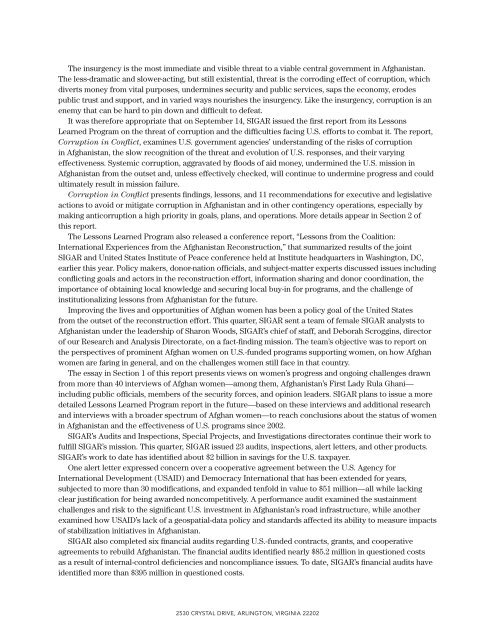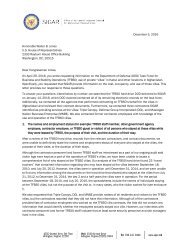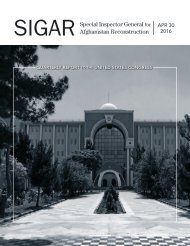SIGAR
2016-10-30qr
2016-10-30qr
Create successful ePaper yourself
Turn your PDF publications into a flip-book with our unique Google optimized e-Paper software.
The insurgency is the most immediate and visible threat to a viable central government in Afghanistan.<br />
The less-dramatic and slower-acting, but still existential, threat is the corroding effect of corruption, which<br />
diverts money from vital purposes, undermines security and public services, saps the economy, erodes<br />
public trust and support, and in varied ways nourishes the insurgency. Like the insurgency, corruption is an<br />
enemy that can be hard to pin down and difficult to defeat.<br />
It was therefore appropriate that on September 14, <strong>SIGAR</strong> issued the first report from its Lessons<br />
Learned Program on the threat of corruption and the difficulties facing U.S. efforts to combat it. The report,<br />
Corruption in Conflict, examines U.S. government agencies’ understanding of the risks of corruption<br />
in Afghanistan, the slow recognition of the threat and evolution of U.S. responses, and their varying<br />
effectiveness. Systemic corruption, aggravated by floods of aid money, undermined the U.S. mission in<br />
Afghanistan from the outset and, unless effectively checked, will continue to undermine progress and could<br />
ultimately result in mission failure.<br />
Corruption in Conflict presents findings, lessons, and 11 recommendations for executive and legislative<br />
actions to avoid or mitigate corruption in Afghanistan and in other contingency operations, especially by<br />
making anticorruption a high priority in goals, plans, and operations. More details appear in Section 2 of<br />
this report.<br />
The Lessons Learned Program also released a conference report, “Lessons from the Coalition:<br />
International Experiences from the Afghanistan Reconstruction,” that summarized results of the joint<br />
<strong>SIGAR</strong> and United States Institute of Peace conference held at Institute headquarters in Washington, DC,<br />
earlier this year. Policy makers, donor-nation officials, and subject-matter experts discussed issues including<br />
conflicting goals and actors in the reconstruction effort, information sharing and donor coordination, the<br />
importance of obtaining local knowledge and securing local buy-in for programs, and the challenge of<br />
institutionalizing lessons from Afghanistan for the future.<br />
Improving the lives and opportunities of Afghan women has been a policy goal of the United States<br />
from the outset of the reconstruction effort. This quarter, <strong>SIGAR</strong> sent a team of female <strong>SIGAR</strong> analysts to<br />
Afghanistan under the leadership of Sharon Woods, <strong>SIGAR</strong>’s chief of staff, and Deborah Scroggins, director<br />
of our Research and Analysis Directorate, on a fact-finding mission. The team’s objective was to report on<br />
the perspectives of prominent Afghan women on U.S.-funded programs supporting women, on how Afghan<br />
women are faring in general, and on the challenges women still face in that country.<br />
The essay in Section 1 of this report presents views on women’s progress and ongoing challenges drawn<br />
from more than 40 interviews of Afghan women—among them, Afghanistan’s First Lady Rula Ghani—<br />
including public officials, members of the security forces, and opinion leaders. <strong>SIGAR</strong> plans to issue a more<br />
detailed Lessons Learned Program report in the future—based on these interviews and additional research<br />
and interviews with a broader spectrum of Afghan women—to reach conclusions about the status of women<br />
in Afghanistan and the effectiveness of U.S. programs since 2002.<br />
<strong>SIGAR</strong>’s Audits and Inspections, Special Projects, and Investigations directorates continue their work to<br />
fulfill <strong>SIGAR</strong>’s mission. This quarter, <strong>SIGAR</strong> issued 23 audits, inspections, alert letters, and other products.<br />
<strong>SIGAR</strong>’s work to date has identified about $2 billion in savings for the U.S. taxpayer.<br />
One alert letter expressed concern over a cooperative agreement between the U.S. Agency for<br />
International Development (USAID) and Democracy International that has been extended for years,<br />
subjected to more than 30 modifications, and expanded tenfold in value to $51 million—all while lacking<br />
clear justification for being awarded noncompetitively. A performance audit examined the sustainment<br />
challenges and risk to the significant U.S. investment in Afghanistan’s road infrastructure, while another<br />
examined how USAID’s lack of a geospatial-data policy and standards affected its ability to measure impacts<br />
of stabilization initiatives in Afghanistan.<br />
<strong>SIGAR</strong> also completed six financial audits regarding U.S.-funded contracts, grants, and cooperative<br />
agreements to rebuild Afghanistan. The financial audits identified nearly $85.2 million in questioned costs<br />
as a result of internal-control deficiencies and noncompliance issues. To date, <strong>SIGAR</strong>’s financial audits have<br />
identified more than $395 million in questioned costs.<br />
2530 CRYSTAL DRIVE, ARLINGTON, VIRGINIA 22202




